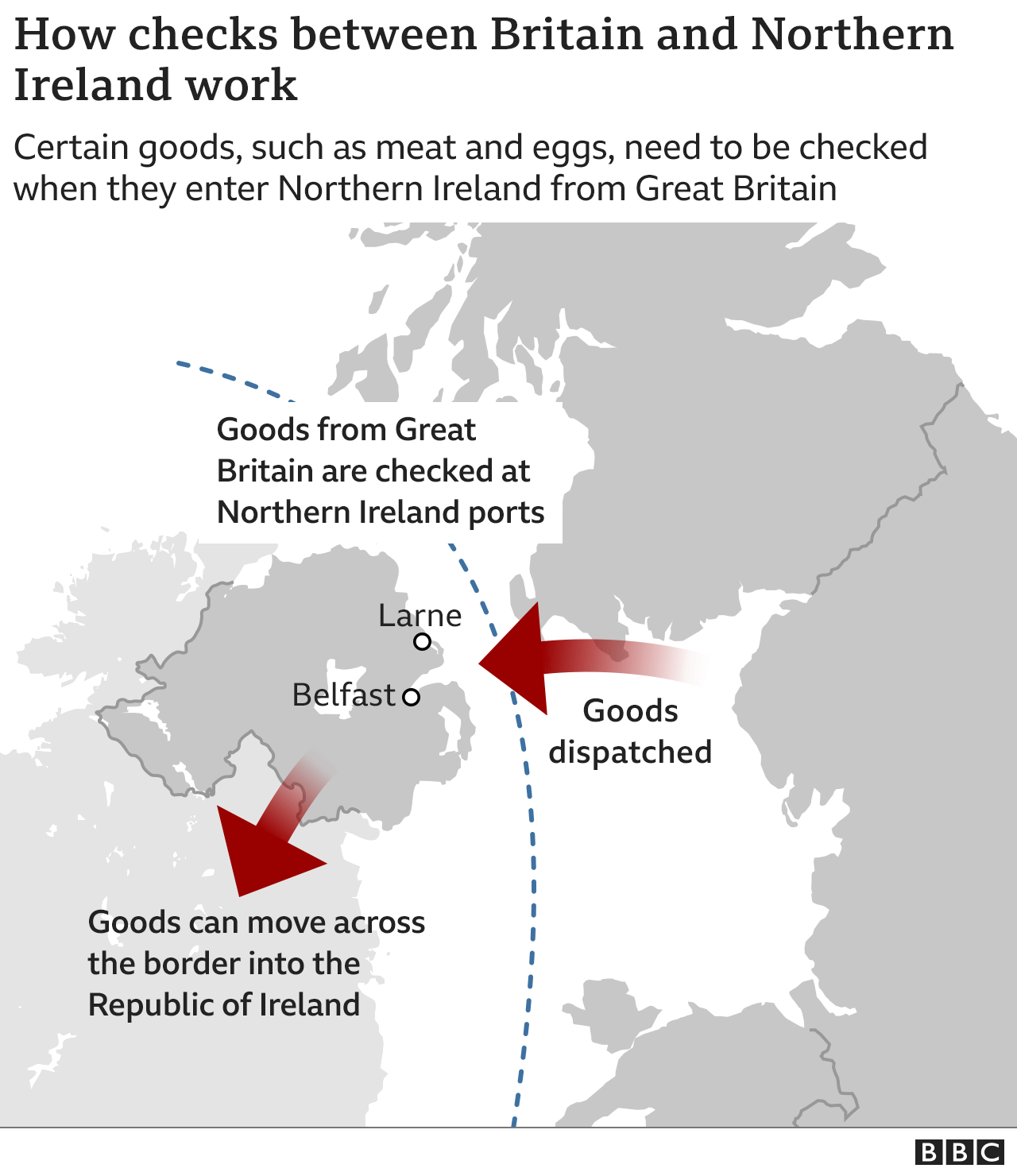BBC News 18 May 2022 - by Chris Mason
What we are witnessing is an unresolved bit of delivering Brexit.
When I interviewed the prime minister in Belfast, he acknowledged what is going on is a direct consequence of the deal he signed.
During those fraught years of rows after the referendum, a persistent issue was the whole business of Northern Ireland.
But, if you can't put up a traditional border, where stuff gets checked, on the border between the UK and EU, logic says you have to put it somewhere else.
And you can't put one on the actual border between Northern Ireland and the Republic of Ireland because keeping that open is seen as a vital part of the peace process.
So where else can it go?
The answer, when the government, and the electorate, said it wanted to "get Brexit done", as the slogan went, was to put it in the Irish Sea, meaning stuff gets checked when it crosses from England, Scotland and Wales, and arrives in Northern Ireland.
The government got Brexit done by agreeing to that. It is called the protocol and it means a border within a country - within the UK.
It meant the UK could leave the European Union.
It meant England, Scotland and Wales could leave the EU's Single Market and Customs Union, as the government had promised.
But it also meant that internal border.
In reality, when the government signed it, it solved what was then today's problem, as it saw it, by creating tomorrow's.
And it is now tomorrow.
Let's be clear, for all those businesses we see on the telly and elsewhere saying the protocol is deeply damaging for them, there are plenty of others who like it and are not agitating for change.
But the simple truth is its existence has consequences.
It means Northern Ireland doesn't have a fully functioning devolved government, because the Democratic Unionists won't go back in until it is changed.
It means ministers worry about the integrity of the UK.
And it means critics say the government is trashing the country's reputation by saying it will flout an international agreement it signed up to only a few years ago.
The government has now said it will introduce a new law to override elements of the protocol it doesn't like.
They're doing this, out of "regret and necessity, not blazing anger" with the EU, I was told.
And this is a lengthy process - nine months to a year was the timeframe put to me - and one that hasn't even started yet.
Details need "a wee bit of bottoming out", one source said.
The big focus will be removing checks on things crossing the Irish Sea from Great Britain to Northern Ireland that are to be used in Northern Ireland.
Ministers want what is called a "green lane" for this stuff.
There would then be a "red lane" for goods going into the European Union. They would still be checked, to respect the EU's Single Market.
The government would also like to see the European Court of Justice no longer have a role in the protocol, and see Northern Ireland no longer remain aligned with some EU rules on Valued Added Tax.
But my understanding is both of these things are seen as less important than the Irish Sea border.
The government will also seek to emphasise its total commitment to an open border on the island of Ireland and that big chunks of the protocol work fine for them.
Actions vs words
I wrote here on Monday that ministers hoped what they did this week might tempt the DUP to at least be willing to get the Northern Ireland Assembly up and running again, if not a full executive, a devolved government.
But the DUP have repeatedly said they want to see action, not words.
And today was, well, more words.
"I'm not sure a Truss statement of intent will have unionists dancing in the streets," was how one DUP source put it to me.
This battle about borders is a row that will rumble on for months, at least.

